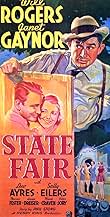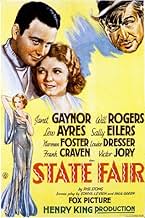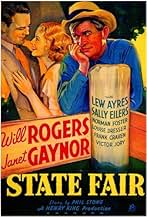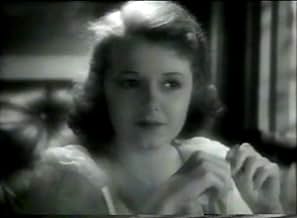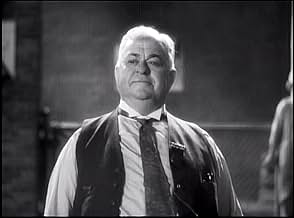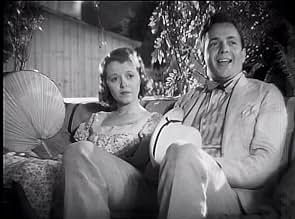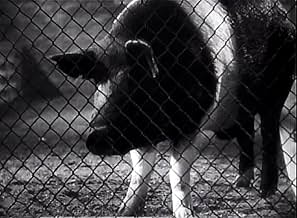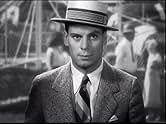IMDb रेटिंग
6.7/10
1.3 हज़ार
आपकी रेटिंग
अपनी भाषा में प्लॉट जोड़ेंAn Iowa family finds adventure, love, and heartbreak when they spend a week at the state fair.An Iowa family finds adventure, love, and heartbreak when they spend a week at the state fair.An Iowa family finds adventure, love, and heartbreak when they spend a week at the state fair.
- 2 ऑस्कर के लिए नामांकित
- 5 जीत और कुल 2 नामांकन
Erville Alderson
- Martin - Hog Breeder
- (बिना क्रेडिट के)
Joe Caits
- Baker A. Noblemable - Judges' Secretary
- (बिना क्रेडिट के)
Hobart Cavanaugh
- Professor Fred Coin - Hog Judge
- (बिना क्रेडिट के)
Judge Dike
- Contest Judge
- (बिना क्रेडिट के)
Harry Holman
- Professor Tyler Cramp - Hog Judge
- (बिना क्रेडिट के)
Doro Merande
- Mrs. Metcalfe's Acquaintance at Food Contest
- (बिना क्रेडिट के)
Edward Mundy
- Barker
- (बिना क्रेडिट के)
Dike of Rosedale
- Blue Boy - a Hog
- (बिना क्रेडिट के)
John Sheehan
- Barker at Aerial Act
- (बिना क्रेडिट के)
फ़ीचर्ड समीक्षाएं
This 1933 film of STATE FAIR is nearly impossible to see except on one Fox cable channel, but is the best of all versions, with genuine and unsentimental writing and acting. Director Henry King propels the leisurely plot with a thrilling moving camera that efficiently depicts the varied sensations of a state fair, from wholesome contest fun to the menace of barkers and carnies.
King has a consistent handle on the theme, that the state fair is a quick microcosm of life, an event that thrusts persons together in a venue that makes possible the "rollercoaster" of infatuation (and sex--this is pre-code pleasure), the tension of competition, and the diversion from hard work in this depression era America. Even "Blue boy" the hog and "self object" of Will Rogers' likeable character discovers the same conflicted feelings of sexual attraction. The cast is excellent, with standouts of Rogers, a most natural performer, in a film that is unpolluted by awkward stereotyped supporting players common to his films. A truly stunning-looking Lew Ayres is a dream of a roller coaster partner, and Victor Jory in his silk shirt perfectly embodies the carnie whom small children fear to encounter outside the midway. But it's the quiet moments that register the most--the pensive characters driving at dusk to the fair, full of private anticipation, still totally one as a family. Modern films rarely dare such introspective glimpses, but this film doesn't bore because it is so true. These rural citizens are proud and flawed, but like the wonderful characters in MEET ME IN ST. LOUIS, they embrace the chance to take in the fun and mystery of life.
King has a consistent handle on the theme, that the state fair is a quick microcosm of life, an event that thrusts persons together in a venue that makes possible the "rollercoaster" of infatuation (and sex--this is pre-code pleasure), the tension of competition, and the diversion from hard work in this depression era America. Even "Blue boy" the hog and "self object" of Will Rogers' likeable character discovers the same conflicted feelings of sexual attraction. The cast is excellent, with standouts of Rogers, a most natural performer, in a film that is unpolluted by awkward stereotyped supporting players common to his films. A truly stunning-looking Lew Ayres is a dream of a roller coaster partner, and Victor Jory in his silk shirt perfectly embodies the carnie whom small children fear to encounter outside the midway. But it's the quiet moments that register the most--the pensive characters driving at dusk to the fair, full of private anticipation, still totally one as a family. Modern films rarely dare such introspective glimpses, but this film doesn't bore because it is so true. These rural citizens are proud and flawed, but like the wonderful characters in MEET ME IN ST. LOUIS, they embrace the chance to take in the fun and mystery of life.
8tavm
Having previously watched both the 1945 and 1962 musical versions of this film, and knowing YouTube had this non-musical version on its site for the last several years, I finally watched this version of State Fair just now. Other than the added songs in the later versions, this is basically the same story for all three...well, except since this one was produced before the Production Code became more strict, it's implied the male teen had something of a real affair with a female performer. (Though I didn't see the scene of them talking off-screen while the bed on-screen was messed up with another scene of a lingerie on the floor during that. Must have been cut after the Code was enforced.) The humor is both verbally subtle and occasionally visual like when the Janet Gaynor character is on somebody's shoulder and she unknowingly plays with that someone's head when she gets excited about a certain horse in a race. Will Rogers as the father is his charming self as he looks after his pig he hopes wins the big contest. And I always loved when the mother (in this version, Louise Dresser) enters her pickles and mincemeat in another contest because of what is in those foods when they're entered! By the way, I like all three versions but if you don't want to hear those songs, I definitely recommend this version of State Fair.
The thing about summer love is that it is uncertain and often temporary. Normally, only the young are afflicted, and, as such a powerful emotion is a novelty to the recipient, it can be very hurtful. "State Fair" chronicles two of these.
The Frake family is preparing for the Iowa state fair, all with different expectations. Pa (Will Rogers) hopes his prize boar, Blue Boy, can win first prize and Ma (Louise Dresser) pins her hopes on her pickles and mincemeat. Teenagers Wayne and Margy are just hoping for... they're not exactly sure, but something exciting.
The nominal star here is Will Rogers and he gives a folksy, homespun performance as Pa - makes you wonder if he's acting or not. Louise Dresser is Ma just as you would imagine Ma would be. She was one of our best actresses and retired too soon. The story, though, focuses on the two young players, Norman Foster (Wayne) and Janet Gaynor (Margy) and their adventurous encounters with complete strangers.
This is a 'Pre-Code' picture and tame by todays (lack of) standards, and so both are seen conversing in bedrooms with above-mentioned strangers (smelling salts, please), but the picture is so well-written that the breach of decorum is hardly noticeable. The story is true to life and shot through with vignettes of family life from an earlier time in America. If you were not alive in the 1930's and did not live in the Midwest, you should see this movie. It is a quintessential family picture with lots of heart, as well as exceptional performances by all parties.
The Frake family is preparing for the Iowa state fair, all with different expectations. Pa (Will Rogers) hopes his prize boar, Blue Boy, can win first prize and Ma (Louise Dresser) pins her hopes on her pickles and mincemeat. Teenagers Wayne and Margy are just hoping for... they're not exactly sure, but something exciting.
The nominal star here is Will Rogers and he gives a folksy, homespun performance as Pa - makes you wonder if he's acting or not. Louise Dresser is Ma just as you would imagine Ma would be. She was one of our best actresses and retired too soon. The story, though, focuses on the two young players, Norman Foster (Wayne) and Janet Gaynor (Margy) and their adventurous encounters with complete strangers.
This is a 'Pre-Code' picture and tame by todays (lack of) standards, and so both are seen conversing in bedrooms with above-mentioned strangers (smelling salts, please), but the picture is so well-written that the breach of decorum is hardly noticeable. The story is true to life and shot through with vignettes of family life from an earlier time in America. If you were not alive in the 1930's and did not live in the Midwest, you should see this movie. It is a quintessential family picture with lots of heart, as well as exceptional performances by all parties.
A farm family encounters situations both poignant & hilarious when they leave home to spend time at the exciting STATE FAIR.
Janet Gaynor gives a sensitive performance as a country girl eager for romance amid the attractions of the Fair. She is both fetching and delightful. She was a big celebrity at the time and gets top billing here even over Will Rogers.
Will gets his own back by deftly underplaying his role as her farmer father. By keeping the corniness to a minimum, he gives the film a special touch of bedrock sensibility and good humor.
The Production Code had obviously not taken effect quite yet, as can be seen by some of the language and situations. These will come as a surprise to some, but were not rare before 1934.
All of Will's scenes are fun - especially those with Miss Gaynor or the hogs. The formidable Louise Dresser appears as his wife. Lew Ayres makes a fine romantic interest for Gaynor & Victor Jory is very good in a small role as an honesty-challenged barker.
Janet Gaynor gives a sensitive performance as a country girl eager for romance amid the attractions of the Fair. She is both fetching and delightful. She was a big celebrity at the time and gets top billing here even over Will Rogers.
Will gets his own back by deftly underplaying his role as her farmer father. By keeping the corniness to a minimum, he gives the film a special touch of bedrock sensibility and good humor.
The Production Code had obviously not taken effect quite yet, as can be seen by some of the language and situations. These will come as a surprise to some, but were not rare before 1934.
All of Will's scenes are fun - especially those with Miss Gaynor or the hogs. The formidable Louise Dresser appears as his wife. Lew Ayres makes a fine romantic interest for Gaynor & Victor Jory is very good in a small role as an honesty-challenged barker.
Overshadowed in this day and age by the two musical film versions that succeeded it, this version of State Fair provides a great showcase for the personality and talent of American institutions Will Rogers. Although I was surprised to see that in the billing, Fox's main female star at the time, Janet Gaynor, was billed above him. The power of what winning the first Best Actress Oscar can get you.
It was probably only natural that the two would eventually be in a project together. Gaynor always played good girls, fresh from the farm like Melissa Frake, her best example of that is Esther Blodgett in A Star Is Born. As for Rogers, his patented brand of homespun humor had already established his legend.
When I did a review of Junior Bonner, I said that the film was simply the story of a rodeo family's day at the Presscott Frontier Rodeo. State Fair is a simple film, without any pretensions; the story of the Frake Family and its visit to the State Fair where all of them have an unforgettable time.
I wouldn't believe it, but Will Rogers never had a better straight man than his prize hog Blue Boy who perks up and struts his stuff when an attractive sow comes to his attention. But he's far from the only one who finds romance.
Janet Gaynor meets small city reporter Lew Ayres who says that even though the paper is a Republican one, don't blame him and the rest who have to work there to make a living. Republicans were not highly thought of in the wake of the Depression back in the day. Her wholesomeness attracts him.
As for son Norman Foster he gets quite a lesson in love in a most explicit before the Code encounter with trapeze artist Sally Eilers. Surprising for a Will Rogers film in my humble opinion.
Even Louise Dresser comes home a winner, taking first prize in just about everything she prepares due to Rogers spiking her cooking liberally with some schnapps. He knew the best way to the judge's heart.
State Fair is a great piece of nostalgic Americana and a great showcase for that American institution named Will Rogers.
It was probably only natural that the two would eventually be in a project together. Gaynor always played good girls, fresh from the farm like Melissa Frake, her best example of that is Esther Blodgett in A Star Is Born. As for Rogers, his patented brand of homespun humor had already established his legend.
When I did a review of Junior Bonner, I said that the film was simply the story of a rodeo family's day at the Presscott Frontier Rodeo. State Fair is a simple film, without any pretensions; the story of the Frake Family and its visit to the State Fair where all of them have an unforgettable time.
I wouldn't believe it, but Will Rogers never had a better straight man than his prize hog Blue Boy who perks up and struts his stuff when an attractive sow comes to his attention. But he's far from the only one who finds romance.
Janet Gaynor meets small city reporter Lew Ayres who says that even though the paper is a Republican one, don't blame him and the rest who have to work there to make a living. Republicans were not highly thought of in the wake of the Depression back in the day. Her wholesomeness attracts him.
As for son Norman Foster he gets quite a lesson in love in a most explicit before the Code encounter with trapeze artist Sally Eilers. Surprising for a Will Rogers film in my humble opinion.
Even Louise Dresser comes home a winner, taking first prize in just about everything she prepares due to Rogers spiking her cooking liberally with some schnapps. He knew the best way to the judge's heart.
State Fair is a great piece of nostalgic Americana and a great showcase for that American institution named Will Rogers.
क्या आपको पता है
- ट्रिवियाDirector Henry King went to the 1932 Iowa State Fair and Exposition in Des Moines with Stong and a camera crew at the invitation of the fair and filmed background material there. Joseph A. Valentine and Edwin Hammeras photographed background plates, atmospheric shots and race sequences at the fair and used the new Eastman Grayback Background Negative film stock. The rest of the production was shot an Eastman Supersensitive Negative stock and used two cameras wherever possible. Fox purchased three hogs from the fair, including the grand champion, Dike of Rosedale, who was cast as "Blue Boy."
- गूफ़The storekeeper says that Henry VIII had eight wives. He had six.
- भाव
Abel Frake: Wayne's got a girl.
Storekeeper: So did Henry VIII, eight of them, but he always showed up at every state affair with a new one.
- क्रेज़ी क्रेडिटMost of the credits appear as posters being put up on billboards by workmen. In the film's final scene, there is a heavy rain, and as it washes away the poster bearing the title "State Fair", we see that it was pasted over another poster that says "The End".
- इसके अलावा अन्य वर्जनThe original version had a bedroom scene in which Emily and Wayne are heard talking offscreen with Emily's negligee lying on a chair, suggesting that they were in bed together for illicit sex. This scene was cut in 1935 from all existing prints in order to get an approval certificate from the PCA for a re-release. The scene is not included in the print that the Fox Movie Channel currently broadcasts.
- कनेक्शनFeatured in Lest We Forget (1937)
- साउंडट्रैकRomantic
(1933) (uncredited)
Music by Louis De Francesco
Lyrics by Val Burton and Will Jason
Played during the opening credits and often in the score
Sung offscreen by an unidentified male at the fair
Partially sung a cappella by Janet Gaynor
टॉप पसंद
रेटिंग देने के लिए साइन-इन करें और वैयक्तिकृत सुझावों के लिए वॉचलिस्ट करें
- How long is State Fair?Alexa द्वारा संचालित
विवरण
- रिलीज़ की तारीख़
- कंट्री ऑफ़ ओरिजिन
- भाषा
- इस रूप में भी जाना जाता है
- Drzavni sajam
- फ़िल्माने की जगहें
- डे मोएन, आयोवा, संयुक्त राज्य अमेरिका(State Fair and Exposition exterior scenes)
- उत्पादन कंपनी
- IMDbPro पर और कंपनी क्रेडिट देखें
- चलने की अवधि1 घंटा 39 मिनट
- रंग
- पक्ष अनुपात
- 1.37 : 1
इस पेज में योगदान दें
किसी बदलाव का सुझाव दें या अनुपलब्ध कॉन्टेंट जोड़ें

